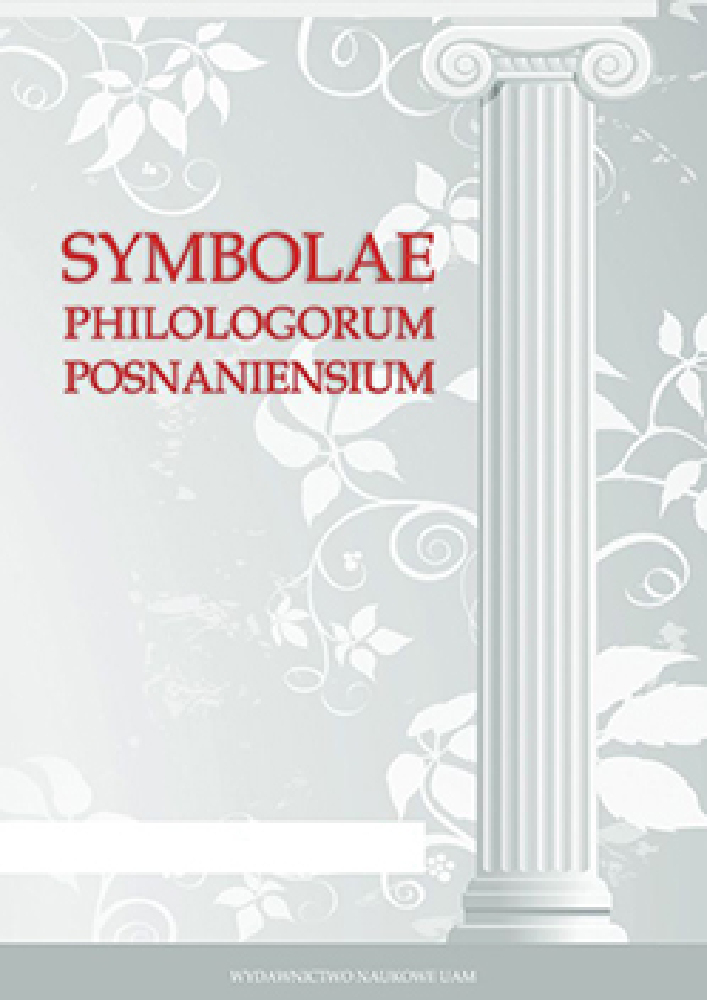Abstrakt
Madness is a constant motif in ancient literature. It was often used by playwrights, including the three greatest tragedians of the Classical Greece: Aeschylus, Sophocles and Euripides. One of the most interesting plays dealing with issues of madness is Euripidean Orestes. This play has received numerous commentaries written by scholiasts, who described all aspects of the state of mania. The article is devoted to the analysis of madness and the corpus of texts are scholia describing Orestes’ disease. Commentaries allow us to establish a definition of mania, show its sources and describe its various physical and mental symptoms. The material presented in the article shows how interesting the phenomenon of madness was for the scholiasts.
Bibliografia
Źródła, przekłady, komentarze
Arystoteles, O duszy, przeł. P. Siwek, w: Dzieła wszystkie, t. III, Warszawa 1992.
Euripide, Orestes, introduzione, traduzione e note di E. Medda, Milano 2001 [=Medda 2001].
Eurypides, Tragedie, t. II, przeł. J. Łanowski, Warszawa 1972.
Euripidis Fabulae, vol. III, ed. G. Murray, Oxonii 1960.
Mastronarde 2020: D.J. Mastronarde, Eurypides. Scholia: Scholia on „Orestes” 1–500, Oakland 2020, w: [https://escholarship.org/uc/item/7xp733bb].
Porter 1994: J.P. Porter, Studies in Euripides’ ‘Orestes’, Leiden–New York–Köln 1994.
Rutheford 2005: R. Rutheford, Note on text, w: Euripides, ‘The Bacchae’ and Other Plays, transl. J. Vie, London 2005.
Tragicorum Graecorum Fragmenta, vol. V, ed. R. Kannicht, Göttingen 2004.
Opracowania
Bosman 1993: P.R. Bosman, Pathology of a Guilty Conscience: the Legacy of Euripides’ ‘Orestes’, „Acta Classica” 36 (1993), 11–25.
Chiżyńska 2012: K. Chiżyńska, Scholia Medicea in Aeschyli „Persas” – opracowanie, przekład, komentarz [rozprawa doktorska], Uniwersytet Łódzki 2012.
Ciani 1974: M.G. Ciani, Lessico e funzione della follia nella tragedia greca, „Bolletino dell’Istituto di Filologia Greca dell’Univestità di Padova” 1 (1974), 71–110.
Collinge 1962: N.E. Collinge, Medical Terms and Clinical Attitudes in the Tragedians, „Bulletin of the Institute of Classical Studies of the University of London” 9 (1962), 43–55.
Czerwińska 2013: J. Czerwińska, Innowacje mitologiczne i dramaturgiczne Eurypidesa. Tragedia. Tragikomedia, Łódź 2013.
Diggle 1991: J. Diggle, The Textual Tradition of Euripides’ „Orestes”, Oxford 1991.
Donadi 1974: F. Donadi, In margine alla follia di Oreste, „Bolletino dell’Istituto di Filologia Greca dell’Univestità di Padova” 1 (1974), 111–127.
Easterling, Hall 2002: P. Easterling, E. Hall, Greek and Roman Actors: Aspects of an Ancient Profession, Cambridge 2002.
Ferrini 1978: F. Ferrini, Tragedia e patologia: lessico ippocratico in Euripide, „Quaderni Urbinati di Cultura Classica” 29 (1978), 49–62.
Hartigan 1987: K.V. Hartigan, Euripidean Madness: ‘Heracles’ and ‘Orestes’, „Greece and Rome” 34 (1987), 126–135.
Miller 1944: H.W. Miller, Medical Terminology in Tragedy, „Transactions and Proceedings of American Philological Association” 75 (1944), 156–167.
Smith 1967: W.D. Smith, Disease in Euripides’ „Orestes”, „Hermes” 95 (1967), 291–307.
Turasiewicz 1995: R. Turasiewicz, Opętanie Penteusa: Bachantki Eurypidesa, „Eos” LXXXIII (1995), 217–226.
Wright 2013: M. Wright, Euripides: ‘Orestes’, London–New Dehli–New York–Sydney 2013.
Licencja

